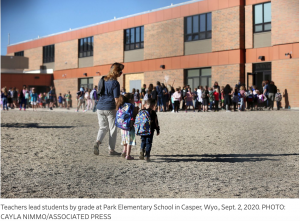Regular readers of this blog know I sometime stray from the topic of healthcare to passionate issues of mine. One of those is school choice. School choice represents the solution to the problem of poor education, especially in low-income families who can’t afford better. School choice is the path to upward mobility for these children who need a good education to get ahead in this world.
We tend to think of this problem as an inner-city phenomenon, where poor public city schools trap low-income minority children in a never-ending spiral that keeps them impoverished – and that’s certainly often the case. But this problem also is experienced in rural America, where good public schools are often rare, too.
Republicans are correctly associated with favoring school choice in most states, while Democrats usually oppose school choice in deference to their teachers unions supporters. But in rural America, even the Republicans have often opposed school choice, encouraged by teachers unions. But now that pattern may be changing.
Corey DeAngelis, writing for The Wall Street Journal, tells us the Wyoming Senate passed a broad school-choice bill Thursday by a vote of 28-3. The bill would establish Wyoming’s first education savings account program, allowing families with preschool- to high-school-age children earning up to five times the federal poverty level—$156,000 for a family of four—to take their children’s state-funded education dollars to the public, private, charter or home-based providers of their choosing. The grant would start at $6,000 for children in the lowest income category and decline with rising family income. The bill has already passed in the House, so it now heads to Governor Mark Gordon for his signature.
This breaks the trend for Republicans to oppose school choice, backed by the teachers unions. They say their constituents don’t want it because there aren’t many private schools in their districts.
Yet the nine most rural states in the country (as measured by population share) now have some form of private school choice. Maine and Vermont have the oldest private-school voucher programs in the U.S., both enacted in the late 19th century for students who live in rural districts without public schools. Both programs allow state funding to follow the child to the public or private school his family chooses.
In 2021 West Virginia became the first state to make school choice available to all families, regardless of income. And in Alabama last Thursday, Gov. Kay Ivey signed a universal school choice bill into law. That is notable because the state teachers union, the Alabama Education Association, has contributed more than $3 million to Republican legislative campaigns since 2018. A report by the Alabama Policy Institute last year found the union “was the single largest contributor to Republicans in the last election cycle.”
Mr. DeAngelis is a senior fellow at the American Federation for Children. He says, “In Texas my organization’s super PAC, the American Federation for Children Victory Fund, targeted 13 antichoice Republican incumbents for defeat in last week’s primaries. Ten either lost outright or were forced into runoffs. Rural Republican resistance to school choice is crumbling. Now if only Democrats would get on board.”
Former U.S. Secretary of State Condoleezza Rice has called it “the civil-rights movement of our times.” School choice is the freight train coming that can’t be stopped. It’s time for all Americans to “get on board!” The education of our future generation is at stake.


